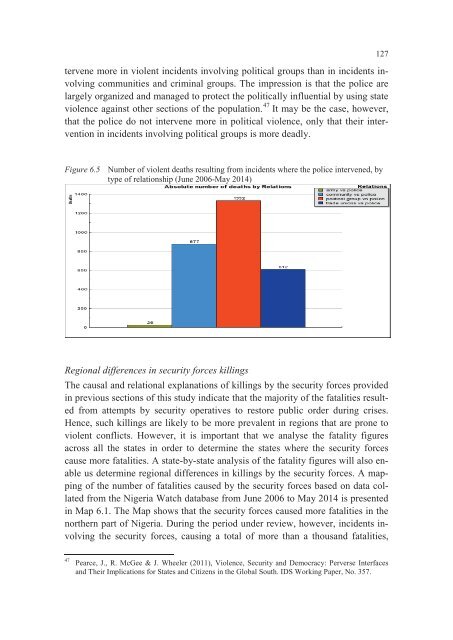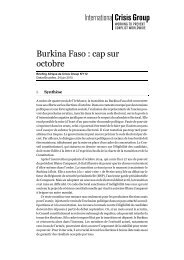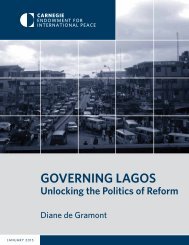Violence in Nigeria
ASC-075287668-3743-01
ASC-075287668-3743-01
You also want an ePaper? Increase the reach of your titles
YUMPU automatically turns print PDFs into web optimized ePapers that Google loves.
tervene more <strong>in</strong> violent <strong>in</strong>cidents <strong>in</strong>volv<strong>in</strong>g political groups than <strong>in</strong> <strong>in</strong>cidents <strong>in</strong>volv<strong>in</strong>g<br />
communities and crim<strong>in</strong>al groups. The impression is that the police are<br />
largely organized and managed to protect the politically <strong>in</strong>fluential by us<strong>in</strong>g state<br />
violence aga<strong>in</strong>st other sections of the population. 47 It may be the case, however,<br />
that the police do not <strong>in</strong>tervene more <strong>in</strong> political violence, only that their <strong>in</strong>tervention<br />
<strong>in</strong> <strong>in</strong>cidents <strong>in</strong>volv<strong>in</strong>g political groups is more deadly.<br />
127<br />
Figure 6.5 Number of violent deaths result<strong>in</strong>g from <strong>in</strong>cidents where the police <strong>in</strong>tervened, by<br />
type of relationship (June 2006-May 2014)<br />
Regional differences <strong>in</strong> security forces kill<strong>in</strong>gs<br />
The causal and relational explanations of kill<strong>in</strong>gs by the security forces provided<br />
<strong>in</strong> previous sections of this study <strong>in</strong>dicate that the majority of the fatalities resulted<br />
from attempts by security operatives to restore public order dur<strong>in</strong>g crises.<br />
Hence, such kill<strong>in</strong>gs are likely to be more prevalent <strong>in</strong> regions that are prone to<br />
violent conflicts. However, it is important that we analyse the fatality figures<br />
across all the states <strong>in</strong> order to determ<strong>in</strong>e the states where the security forces<br />
cause more fatalities. A state-by-state analysis of the fatality figures will also enable<br />
us determ<strong>in</strong>e regional differences <strong>in</strong> kill<strong>in</strong>gs by the security forces. A mapp<strong>in</strong>g<br />
of the number of fatalities caused by the security forces based on data collated<br />
from the <strong>Nigeria</strong> Watch database from June 2006 to May 2014 is presented<br />
<strong>in</strong> Map 6.1. The Map shows that the security forces caused more fatalities <strong>in</strong> the<br />
northern part of <strong>Nigeria</strong>. Dur<strong>in</strong>g the period under review, however, <strong>in</strong>cidents <strong>in</strong>volv<strong>in</strong>g<br />
the security forces, caus<strong>in</strong>g a total of more than a thousand fatalities,<br />
47<br />
Pearce, J., R. McGee & J. Wheeler (2011), <strong>Violence</strong>, Security and Democracy: Perverse Interfaces<br />
and Their Implications for States and Citizens <strong>in</strong> the Global South. IDS Work<strong>in</strong>g Paper, No. 357.






